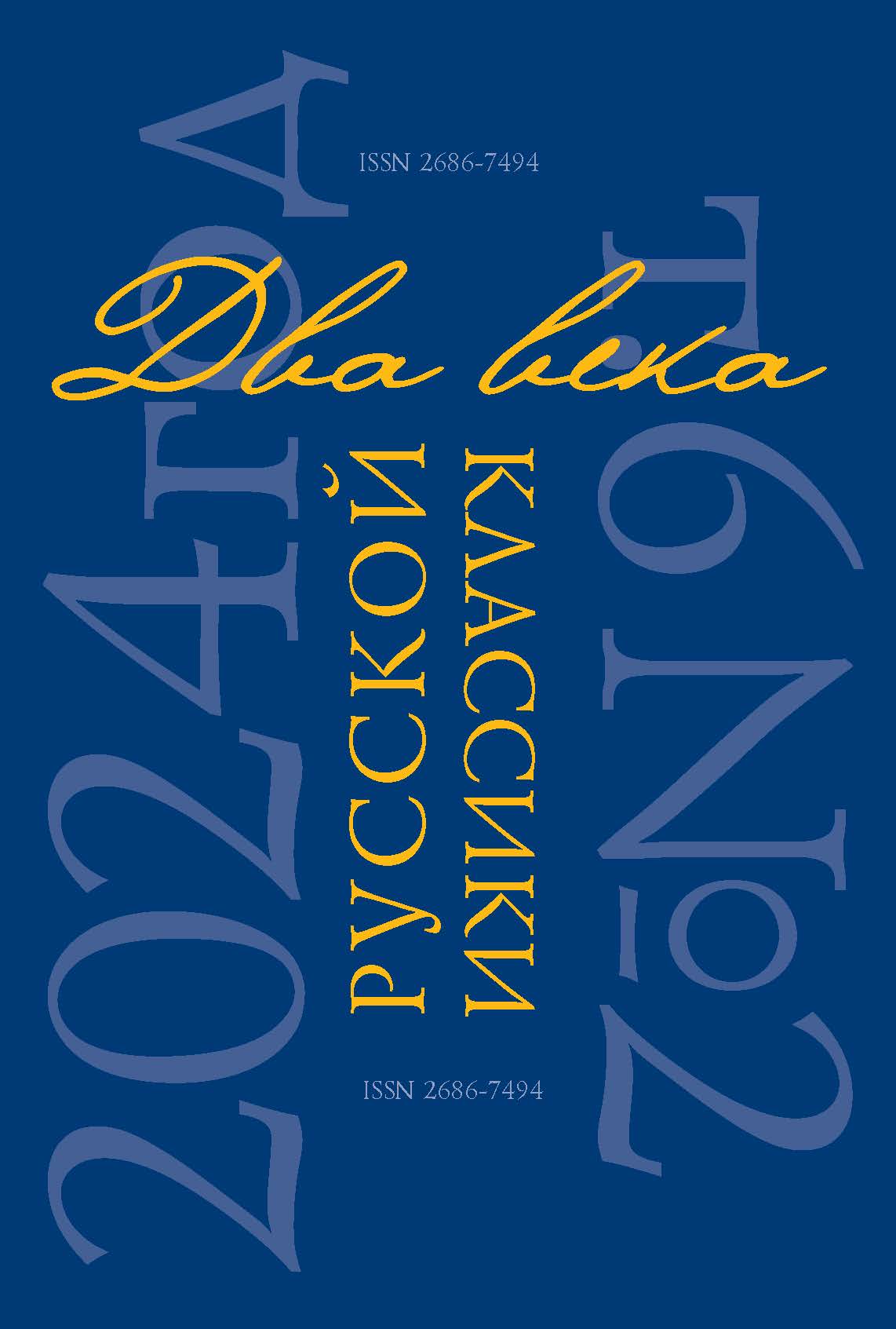Abstract:
The article is devoted to the originality of L. N. Tolstoy’s early story “A Billiard-Marker’s Notes” and the history of its writing with the use of preparatory materials. The author aims to analyze and show the interrelation of a wide range of psychological, socio-ethical, and ideological issues raised in the story, which deeply worried the writer in the 1850s. The article proves that the artist’s choice of the genre of “notes” and first-person narratives allowed him to diversify the plot, methods of psychological analysis, and images of the characters’ inner world. The article pays considerable attention to such a feature of “A Billiard-Marker’s Notes” in terms of narratology as the presence of two characters-narrators, opposite to each other in age, social status, level of development, and bearers of different speech styles. This technique allows the writer to depict dramatically Nekhlyudov’s loneliness, “lostness,” and the existing blatant gap between the worldview of the nobility and the people and their ethics. The narrator’s expressive word, completing the work, brings it to the existential level. The image of the character-marker and his perception of reality testifies to the connections of “A Billiard-Marker’s Notes” with the traditions of the “natural school,” its humanistic principles, and democracy. This story, along with other works of the 1850s, contains the origins of the religious and philosophical views of the writer-thinker.
References
Andreeva, V. G. “ʽChelovek sozdan byt’ oporoi drugomu, potomu chto emu samomu nuzhna opora’: perepiska L. N. Tolstogo i N. A. Nekrasova” [“ʽMan Was Created to Be a Support to Another, Because He Himself Needs Support’: Correspondence Between Leo Tolstoy and Nikolay Nekrasov”]. Vestnik Permskogo universiteta. Rossiiskaia i zarubezhnaia filologiia, vol. 15, no. 3, 2023, pp. 74–83. https://doi.org/10.17072/2073-6681-2023-3-74-83 (In Russ.)
Avanesov, S. S. Vol’naia smert’ [Free Death], part 1: Osnovaniia filosofskoi suitsidologii [Foundations of Philosophical Suicidology]. Veliky Novgorod, Novgorod State University Publ., 2020. 521 p. (In Russ.)
Bagieva, Z. R. “Epistoliarnyi zhanr v russkoi literature” [“Epistolary Genre in Russian Literature”]. Aktual’nye issledovaniia, no 2 (5), 2020, pp. 26–28. (In Russ.)
Burnasheva, N. I. “V poiskakh formy povestvovaniia: rasskaz L. N. Tolstogo ʽZapiski markera’ i roman M. Iu. Lermontova ʽGeroi nashego vremeni’.” [“In Search of the Storytelling Form: L. N. Tolstoy’s Story ʽA Billiard-Marker’s Notes’ and M. Yu. Lermontov’s Novel ʽA Hero of Our Time’.”] Nauka, obrazovanie i eksperimental’noe proektirovanie [Science, Education and Experimental Design]. Moscow, Moscow Architectural Institute Publ., 2014, pp. 528–529. (In Russ.)
Burnasheva, N. I. “O svoeobrazii povestvovatel’noi manery Tolstogo v ʽZapiskakh markera’.” [“On the Originality of Tolstoy’s Narrative Style in ʽA Billiard-Marker’s Notes’.”] Iasnopolianskii sbornik: literaturno-kriticheskie stat’i i materialy o zhizni i tvorchestve L. N. Tolstogo [Yasnaya Polyana Collection: Literary and Critical Articles and Materials on L. N. Tolstoy’s Life and Work]. Tula, Knizhnoe izdatel’stvo Publ., 1984, pp. 105–110. (In Russ.)
Kliuzova, M. L. “Antropologicheskoe uchenie L. N. Tolstogo: teoreticheskie osnovaniia i prakticheskii smysl” [“Anthropological Doctrine of L. N. Tolstoy: Theoretical Foundations and Practical Meaning”]. Eticheskaia mysl’, no. 8, 2008, pp. 65–86. (In Russ.)
Korman, B. O. “Itogi i perspektivy izucheniia problemy avtora” [“Results and Prospects for Studying the Author Problem”]. Izbrannye trudy po teorii i istorii literatury [Selected Works on the Theory and History of Literature]. Izhevsk, Udmurt University Publ., 1992, pp. 59–67. (In Russ.)
Kupreianova, E. N. Molodoi Tolstoi [Young Tolstoy]. Tula, Knizhnoe izdatel’stvo Publ., 1956. 216 p. (In Russ.)
Kutsenko, E. A. Chelovek i printsipy ego izobrazheniia v rasskaze Tolstogo “Zapiski markera.” Analiz literaturnogo proizvedeniia [Man and the Principles of His Depiction in Tolstoy’s Story “A Billiard-Marker’s Notes.” Analysis of a Literary Work]. Kirov, Vyatka State University Publ., 1995, pp. 55–62. (In Russ.)
Mann, Iu. V. “Natural’naia shkola” [“Natural School”]. Istoriia vsemirnoi literatury: v 8 t. [History of World Literature: in 8 vols.], vol. 6. Moscow, Nauka Publ., 1989, pp. 384–396. (In Russ.)
Oleshchuk, A. V. “Izdatel’skii proekt N. A. Nekrasova ʽDlia legkogo chteniia’ (1856–1859) kak legitimatsiia ʽsovremennoi literatury’.” [“N. A. Nekrasov’s Publishing Project ʽFor Easy Reading’ (1856–1859) as a Legitimation of ʽModern Literature’.”] Nekrasov v XXI veke. Materialy mezhdunarodnogo nauchnogo kongressa [Nekrasov in the 21st Century. Materials of the International Scientific Congress]. Yaroslavl, Akademiia 76 Publ., 2021, pp. 192–193. (In Russ.)
Fatiushina, E. Iu. Povest’ “Al’bert” kak khudozhestvennyi eksperiment L. N. Tolstogo [The Story “Albert” as an Artistic Experiment by L. N. Tolstoy: PhD Dissertation]. Moscow, 2005. 249 p. (In Russ.)
Eikhenbaum, B. M. Molodoi Tolstoi [Young Tolstoy]. Peterburg, Berlin, Izdatel’stvo Grzhebina Publ., 1922. 154 p. (In Russ.)









